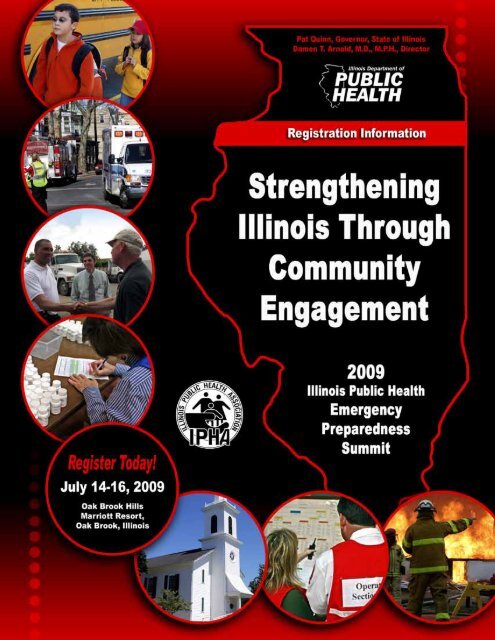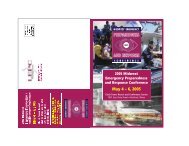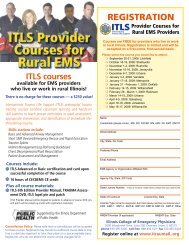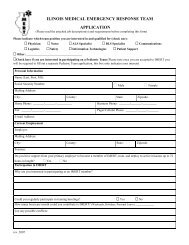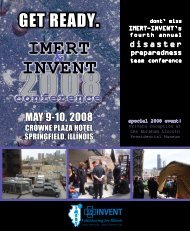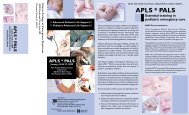Summit Invitation - The Illinois Medical Emergency Response Team
Summit Invitation - The Illinois Medical Emergency Response Team
Summit Invitation - The Illinois Medical Emergency Response Team
You also want an ePaper? Increase the reach of your titles
YUMPU automatically turns print PDFs into web optimized ePapers that Google loves.
Steering Committee:Dr. Damon T. Arnold, <strong>Summit</strong> Co-ChairKrissy Roseberry, <strong>Summit</strong> Co-ChairJessica PickensDr. Walter J. BradleyWinfred RawlsDavid CulpAdvisory CommitteeSharie Sommer, Chair, Exhibits/SponsorsVicky Ritz, Chair, LogisticsAlexandria Reed, Co-Chair, RoundtablesMarc McCloskey, Co-Chair, RoundtablesSarah Blank, Chair, Technical ProgramHalley Moore, Chair, AwardsLinda AngarolaConnie BrooksElaine DarnallDr. Leon DingleDarryl DragooCindy FlaytonJonathan GunnDave HassMark HayesChris HoffKim HunterGretchen JarrettTom JohnsonKim Conrad JuniusJudy KaueraufJackie KilpatrickJoe MitchellJanet NussElizabeth PatonLeslie PiotrowskiDan RiemannFrankie-Marie ShipmanMarilyn ThomasIrene WadhamsLisa WaxPat Welch<strong>Summit</strong> <strong>Invitation</strong>On behalf of each member of the <strong>Illinois</strong> Departmentof Public Health, I would like to invite you to be a partof the 2009 <strong>Illinois</strong> Public Health <strong>Emergency</strong> Preparedness<strong>Summit</strong>: “Strengthening <strong>Illinois</strong> Through CommunityEngagement.” Perhaps more than ever before, it isimperative that we join together as a unified communityto prepare our state in the event of a natural disaster orpublic health threat. This year’s summit will focus oncritical issues facing us as public health and emergency response professionals andoffer all of us an opportunity to share our experiences and lessons learned in the field.<strong>The</strong> program agenda offers a wealth of nationally and internationally renowned speakersand experts that you will not want to miss!I strongly encourage you to attend this important event and join us as we work togetherto prepare and strengthen <strong>Illinois</strong>.Damon T. Arnold, M.D., M.P.H.Director<strong>Illinois</strong> Department of Public HealthObjectiveThis summit is designed to provide a comprehensive overview of critical public healthpreparedness and emergency response issues, as well as the importance of communityengagement and collaboration.Target AudienceThis multi-disciplinary program is designed to benefit a broad range of public healthprofessionals involved in emergency preparedness, planning and response, includingstate and local health professionals in the following disciplines: public health administration,environmental health, nursing, communicable disease, laboratory services,food protection, immunization, hospital emergency services, allied health and otheremergency response areas.
<strong>Summit</strong> HighlightsSATELLITE BROADCASTSThis year, the summit will offer national viewing, via satellite broadcast,of the keynote speeches. This unique feature will allow colleaguesfrom across the nation to view the presentations made by our expertplenary speakers. For more information on registering as a satellitedownlink site, please visit the summit Web site at www.ipha.com.LIVE WEBCASTS<strong>The</strong> summit also will feature live webcasts of the keynote speeches,as well as selected other sessions. If you are unable to attendthe summit, presentations will be streamed to the Web, enablingyou to view the presentations live via your desktop computer. Alink to the webcasts will be available on the <strong>Illinois</strong> Public HealthhAssociation Web site at www.ipha.com during the summit. Clickon “2009 <strong>Illinois</strong> Public Health <strong>Emergency</strong> Preparedness <strong>Summit</strong>”for further instructions. Look for the ( ) symbol in this brochurefor the dates and times of the webcasts. Also, note that the webcastswill be archived and made available through the IPHA Website for 30 days following the summit.EXHIBITS<strong>The</strong> summit will feature a variety of vendors, organizations andprograms on display for participants to visit. <strong>The</strong> exhibits will beavailable from 8 a.m. to 5 p.m. Wednesday, July 15.CONTINUING EDUCATION CREDITSContinuing education credits will be available for <strong>Illinois</strong> licensed environmentalhealth practitioners (LEHP), emergency medical technicians(EMT), trauma nurse specialists (TNS), emergency communicationsregistered nurses (ECRN), pre-hospital registered nurses (PHRN) andlicensed social workers/licensed clinical social workers (LSW/LCSW).Continuing nursing education for registered nurses (CNEs) will beprovided by Oakton Community College, Alliance for Lifelong Learning,Continuing Education for Health Professionals (OCC/ALL/CEHP),accredited as a provider of continuing nursing education by the AmericanNurses Credentialing Center’s Commission on Accreditation.<strong>The</strong> <strong>Illinois</strong> Public Health Association is a designated provider ofcontinuing education contact hours (CECH) in health education bythe National Commission for Health Education Credentialing Inc.This program is a designated event for CHES Category I CECH.Oakton Community College also will provide universal Continuing EducationUnits for other professionals. One universal training hour (UTH)from Oakton Community College is equal to one 60-minute clock hour.Participants requesting certificates will need to sign in each day atthe continuing education table at the summit. Certificates will bemailed after the summit.PRE-SUMMIT WORKSHOPSA series of pre-summit workshops will be offered from 8 a.m. to 11a.m. and 1:30 p.m. to 4:30 p.m. Tuesday, July 14. <strong>The</strong>se skillbuildingsessions will focus on critical issues related to public healthpreparedness, response and recovery. Pre-registration is required.CONCURRENT SESSIONSThis year’s summit will offer a top-quality program agenda with morethan 20 concurrent sessions centered around eight focus areas:• Natural Disasters • Lessons Learned• Building Skill Capacity • EMS Challenges in Preparedness• Emerging Issues• Community Engagement• Public Information and • Vulnerable PopulationsCommunicationSPECIAL NEEDS ROUNDTABLESRoundtable discussions focused on special needs issues will beheld at the summit from 8 a.m. to 9 a.m. Wednesday, July 15.<strong>The</strong> format will consist of your choice of attending two 25-minutesmall group presentations within the one-hour time slot. <strong>The</strong>seroundtable discussions will be presented by local public healthprofessionals and hospital staff from across the state on planningand response issues related to special needs populations in anemergency situation.LESSONS LEARNED ROUNDTABLESRoundtable discussions focused on lessons learned will be heldat the summit from 8 a.m. to 9 a.m. Thursday, July 16. <strong>The</strong> formatwill consist of your choice of attending two 25-minute small grouppresentations within the one-hour time slot. <strong>The</strong>se roundtablediscussions will be presented by local public health professionalsand hospital staff from across the state. This will be an opportunityto learn and share knowledge with colleagues on projects, modelprograms, exercises, community collaboration, and more.WELCOME RECEPTIONPlan to attend the welcome reception from 4:30 p.m. to 6 p.m.Tuesday, July 14. Enjoy live music and complimentary horsd’oeuvres. This will be an excellent opportunity to network withyour counterparts from across <strong>Illinois</strong>.DIRECTOR’S AWARDS RECEPTION & BOOK SIGNING EVENTNew to the summit this year will be an awards reception and booksigning event from 5 p.m. to 7 p.m. Wednesday, July 15. Joinus to honor colleagues and community members who have beenchosen to receive an award for their work in preparedness andresponse. Following the awards ceremony, the event will featureseveral well-known public health and preparedness authors. Youwill have the chance to purchase their books and have it signed bythe author. Complimentary hors d’oeuvres will be served.
Keynote SpeakersOPENING SESSION<strong>Team</strong>work in Crisis – <strong>The</strong> Story of Flight 232Captain Alfred C. “Al” HaynesOn July 19, 1989, United Airlines flight 232 departed Denver at 2:09 p.m. and climbed to 37,000 feet. At 3:16p.m. the flight notified Minneapolis Air Traffic Control that the No. Two engine had failed and the aircraft wasmarginally controllable. Captain Al Haynes was the pilot of that infamous flight.That 184 people survived the crash landing of United 232 can be attributed to five main factors: luck, communication,preparation, execution, and cooperation. Luck involved the fact that the airplane remained flyable,and the location, weather, and time of day were favorable. Quick and total response by air traffic control, cockpitand cabin crew training, proper inter-communications training among ground units, and proper use of availablefacilities contributed to the communications factor. A live drill leading to improvements and better planning fordisasters coupled with thorough training of cockpit and cabin crews helped prepare everyone for this seeminglyimpossible task. Everyone responded as his or her training dictated and required a total team effort coupledwith complete cooperation from every agency involved as well as the general public. <strong>The</strong>se factors allowedwhat appeared to be a non-survivable accident to be one in which a large percentage of those aboard survived.Haynes was born in Paris, Texas, and raised in Dallas. He attended Texas A&M College before joining theNaval Aviation Cadet Training program in 1952. He was released from the service in 1956 after serving asa Marine aviator. He joined United Airlines that year as a flight engineer and served in that capacity until hispromotion to first officer in 1963. He flew the DC-6, DC-7, DC-8, Boeing 727, and DC-10. Haynes was promotedto captain in 1985 and flew the Boeing 727 and DC-10 up to his retirement in August 1991, accumulatingmore than 27,000 hours of flight time.Haynes has been a volunteer umpire for Little League Baseball for the past 36 years and a stadium announcerfor high school football for the past 30 years.LUNCHEON SESSIONDisaster Mythology – What Really Happens at the Worst of TimesAmanda RipleyIn 2005, Amanda Ripley covered hurricanes Katrina and Rita from New Orleans helping TIME win two nationalmagazine awards. Two years earlier, she covered the European heat wave, which killed an estimated 50,000people, from TIME’s Paris bureau. On Sept. 11, 2001, Ripley was in New York City. That day and for years afterwards,she wrote extensively about the attacks, the victims and the recovery of the city and the survivors. Todiscuss her stories, she has appeared on NBC’s “Today” Show, ABC News, CNN, FOX News, C-Span, CNBC,MSNBC, NPR and dozens of international, national and local radio shows. What makes Ripley’s work unusualis that she doesn’t just explain what happened, she obsessively investigates why people do what they do, andhow we can do better, combining science and practical lessons with literary storytelling.Ripley also has been integrally involved in TIME’s Person of the Year cover stories. She did extensive reportingfor the 2001 Person of the Year profile of Rudy Giuliani and was the lead writer and reporter for TIME’s2002 People of the Year cover story on the FBI, WorldCom and Enron whistleblowers. In 2004, she traveled toIndia and Bangladesh to write the People of the Year cover profile of Bill and Melinda Gates.Before joining TIME, Ripley covered the D.C. court system for Washington City Paper and reported onCapitol Hill for Congressional Quarterly. She has contributed to the New York Times Magazine, the WashingtonMonthly and Time Out. She received a Bachelor of Arts in Government from Cornell University. She hasreceived awards from the Society of Professional Journalists, the Newswomen’s Club of New York and theWashington Monthly, among others, and she is a two-time Livingston Award finalist. She currently covers riskand human behavior for TIME and other publications in Washington, DC.Ripley is also the author of the popular book, “<strong>The</strong> Unthinkable: Who Survives When Disaster Strikes – andWhy,” which is now being published in 15 countries, from the United Kingdom to China to Brazil.
Keynote SpeakersCLOSING SESSIONPlan, Prepare, PracticeRichard SheirerRichard Sheirer joined Giuliani Partners, LLC as a senior vice president on April 8, 2002 after concludinghis 34-year career in public safety serving the city of New York. In his present position, Sheirer consults withvarious clients on security, safety, preparedness and business continuity as well as on regulatory and otherissues. Mayor Rudy Giuliani appointed Richard Sheirer director of emergency management in February2000 after Sheirer had served 28 years with the New York City Fire Department and almost four years withthe New York City Police Department. On December 31, 2001, Mayor Giuliani’s last personnel action of hisadministration was to appoint Sheirer New York City’s first commissioner of emergency management and thecity’s director of Homeland Security, a position he held until his retirement.Sheirer managed the Office of <strong>Emergency</strong> Management, the agency which is the “eyes and ears of the city.”After September 11, 2001, OEM coordinated the largest response, recovery and cleanup effort in Americanhistory at the World Trade Center. After losing the OEM offices and its <strong>Emergency</strong> Operation Center (EOC) in7 World Trade Center, at that moment in time when the city needed it most on 9/11; under Sheirer’s directionthe OEM staff used all their experience, expertise and ingenuity to rebuild an EOC, which was critical to thesuccess in coordinating the enormous inter-agency operation. In addition, Sheirer and the OEM staff workedwith the mayor’s office to address the needs of families of uniformed and civilian victims, including coordinatingefforts with the New York Commission for the United Nations, Consular Corps and Protocol to addressthe unique needs of foreign citizens and their families affected by the attack.In October 2002, “in recognition of his outstanding dedication and effort in organizing the recovery operationat Ground Zero following the Terrorist Attacks on the World Trade Center on 11 September 2001 and of thecontribution made to helping the relatives of the British victims” Sheirer was awarded an Honorary Commanderof the British Empire bestowed by Queen Elizabeth II.Sheirer has appeared on CNN, “Dateline NBC,” CBS’ “48 hours,” FOX News, MSNBC, <strong>The</strong> History Channeland New York Metropolitan area television and radio stations. He has been profiled in New York Magazine“Man Behind the Mayor,” and in the Wall Street Journal. Sheirer graduated from St. Francis College, Brooklyn,in 1976, with a Bachelor of Arts in Political Science and was awarded an Honorary Doctorate of HumaneLetters from St. John’s University in January 2002, an Honorary Doctorate of Humane Letters from ManhattanvilleCollege in May 2002 and an Honorary Doctor of Laws from Baruch College in May 2002.Pre-Conference Luncheon SessionSpecial Guest Speaker:Prof. Roman Prymula, M.D., Ph.D.Roman Prymula, has served in the Czech Republic Army since its formal establishing in 1993 as successorof the Czechoslovak Army. He acts currently as dean of faculty of Military Health Sciences in Hradec Kralove,chair of the Department of Epidemiology and Professor of Hygiene, Preventive Medicine and Epidemiology.At the same time, he serves as consultant for different national and international organizations. Among others,he is a member of ECDC Management Board, chairman of Central European Vaccine Advisory Group,chairman of the Czech Vaccinological Society, chairman of the Advisory Board for Epidemiology of the CzechChief Public Health Officer and member of district and national boards for emergency planning.Dr. Prymula is involved in numerous research activities in development of new vaccines for both childrenand adults including clinical trials with new vaccines like rotavirus, MMR-V, DTaP-HB-Hib-IPV, pneumococcus,HPV, hepatitis A-typhoid, etc. Dr. Prymula has written numerous publications on vaccine preventableinfectious diseases, including key paper on otitis media in the Lancet and monographs on bioterrorism andSevere Acute Respiratory Syndrome.
<strong>Summit</strong> AgendaTuesday, July 14, 2009EPI-READY: Foodborne Illness <strong>Response</strong> Strategies – PART II• Craig Conover, M.D.• Brian Heiwig, B.S., L.E.H.P.• Stacey L. Hoferka, M.P.H., M.S.I.S.• Bernard Johnson, M.S.• Jayne Nosari, M.P.H., L.E.H.P.• Tom Stolt, M.P.A., L.E.H.P.This one-day training for communicable disease and environmentalhealth staff covers the epidemiology, environmental andlaboratory aspects of a foodborne outbreak investigation. Throughhands-on examples, this session will reinforce the methods forrapidly identifying and investigating a foodborne disease outbreakto allow for implementation of control measures to reduce theincidence of foodborne illnesses. <strong>The</strong> curriculum for this training isfrom a national training program developed and supported by theNational Environmental Health Association and the U.S. Centersfor Disease Control (CDC). You must also attend Part I in themorning.Engaging Public Information Officers Throughout <strong>Illinois</strong>• Melaney Arnold• Debra Quackenbush, M.P.H., C.H.E.S.• Tom Schlueter• Stephen Westbrooks, B.S., C.E.R.C.Panelists from the <strong>Illinois</strong> Department of Public Health and theNorthern <strong>Illinois</strong> Public Health Information Network will discusscoordination of state and local Public Information and Communication(PIC), during routine and emergency situations.<strong>The</strong> Departmentwill describe how information is expected to flow betweenlocal and state public information officers (PIOs). In addition, theywill introduce a new Internet tool to facilitate consistent messagingfor media and review the Department’s PIC Guidance released in2008 to help local health departments with planning. PIOs fromthe Northern <strong>Illinois</strong> Public Health Information Network will shareinformation about the first <strong>Illinois</strong> PIO Network Meeting plannedfor July 16 at the summit. <strong>The</strong>y also will provide information abouttheir regional PIO group and how it operates.2008 Mississippi Flood <strong>Response</strong>: Local, Regional and StatePerspectives• David W. Culp, Ph.D.• Cristy Donaldson• Shay Drummond, R.N., B.S.N.• Scott C. Gauvin• Carla J. Gosney, M.A.• John SimonThis session will feature a joint panel presentation on the responseto the 2008 Mississippi flood from the following perspectives:local health department, local EMA, local volunteer organization,Regional Unified Area Command, and State <strong>Emergency</strong> OperationsCenter. <strong>The</strong> session will predominantly focus on publichealth response roles. <strong>Emergency</strong> management representativeswill address response and request coordination issues at the local,UAC, and state levels. Local public health and local volunteerorganizations will present on the local public health and volunteerresponse. State public health liaisons will present on state publichealth response and roles and coordination with local and UACpublic health. This session also will present challenges faced andre-educate attendees about proper local-regional-state communicationand resource/information request channels used throughouta disaster response.Legal Authority During a Public Health Disaster: HazardousSubstance Discharge• Meredith Davis, M.P.H.<strong>The</strong> goal of this workshop is to improve understanding of law, as apublic health tool, using an interactive case study about a hazardoussubstance discharge. Participants will discuss topics such asmutual aid, public health legal authority in declared and undeclaredemergencies, and legal roles and obligations related to massevacuation. This session is designed for front-line public health,emergency management, and other personnel who may be involvedin planning for and responding to public health emergencies.4:30 p.m. – 6 p.m.Welcome ReceptionJoin us for an opportunity to network with your counterpartsfrom across <strong>Illinois</strong> and enjoy live music and complimentary horsd’oeuvres.
<strong>Summit</strong> AgendaWednesday, July 15, 20097 a.m. – 4:30 p.m.Registration7 a.m. – 9:30 a.m.Continental Breakfast8 a.m. – 9 a.m.Special Needs Roundtables8 a.m. – 5 p.m.Exhibits9 a.m. – 9:30 a.m.Break & Visit Exhibits9:30 a.m. – 11:30 a.m.Opening Plenary SessionWelcoming Remarks• Damon T. Arnold, M.D., M.P.H., Director, <strong>Illinois</strong> Departmentof Public Health• Valerie Webb, M.P.H., President, <strong>Illinois</strong> Public Health Association• Vocalist: Danielle Marie EmmonsKeynote Address<strong>Team</strong>work in Crisis – <strong>The</strong> Story of Flight 232• Captain Alfred C. “Al” Haynes11:30 a.m. – 1:30 p.m.LuncheonDisaster Mythology – What Really Happens at the Worst ofTimes• Amanda Ripley1:30 p.m. – 2 p.m.Break & Visit ExhibitsTRACK KEYT1 - Natural DisastersT2 - Lessons LearnedT3 - Building Skill CapacityT4 - EMS Challenges in PreparednessT5 - Emerging IssuesT6 - Community EngagementT7 - Public Information and CommunicationT8 - Vulnerable Populations2 p.m. – 3:15 p.m.Concurrent <strong>Summit</strong> SessionsT1: Emergencies Happen. ARE YOU READY? We were not.• Charles DeGraw, B.A.This interactive session will include discussions on emergencypreparedness for frontline personnel, what worked and didn’t workafter hurricane Katrina and lessons learned for future planning.(Repeat Session)T2: Election Night Contingency Planning• Walter J. Bradley, M.D., M.B.A., F.A.C.E.P.• Leslee Stein-Spencer, R.N., M.S.• Robert TroyThis session will feature presentations from representatives of theCity of Chicago Fire Department, Chicago Office of <strong>Emergency</strong>Management and Communications, and the <strong>Illinois</strong> Departmentof Public Health’s Office of Preparedness and <strong>Response</strong>. <strong>The</strong>session will demonstrate the expanding role of public health inpre-planning for a major event, contingency planning for ElectionNight. Presenters will be highlighting the benefits of pre-planning,discussing the coordination among local agencies as well as localregional-statecoordination necessary to plan for an event of thismagnitude, and discussing challenges and issues faced.T3: <strong>Emergency</strong> Shelter Assessment• Capt. Mark D. Miller, M.P.H., R.S.This session will cover key environmental and public health issuesthat occur in emergency shelters. In addition, the assessmentprocess and CDC assessment forms will be discussed.T4: <strong>Illinois</strong> Public Health and <strong>Medical</strong> Starcom21 RadioCommunication• Mark VassmerThis session will provide an overview of the State CommunicationInteroperability Plan (SCIP) and Tactical Communication InteroperabilityPlan (TCIP); the Starcom21 radio system, including scope,operation and structure; and discuss <strong>Illinois</strong> ’ public health andmedical radio emergency communications system use policies.T5: Fusion Centers• Damon T. Arnold, M.D., M.P.H.• Winfred RawlsIn developing our country’s response to the threat of terrorism,public safety leaders from all disciplines have recognized theimportance of sharing information and intelligence across agencyborders. Fusion centers bring all relevant parties together tomaximize the ability to prevent and respond to terrorism and other
<strong>Summit</strong> AgendaWednesday, July 15, 2009emergencies. This session will discuss the concept of FusionCenters and the role of public health in its operations.T6: Using Community Volunteer Programs for SchoolPreparedness Activities• Tammy Bennett, P.E.• Phillip Schertzing, Ph.D.This session will include a panel discussion of community volunteerprograms for addressing school preparedness. Campus<strong>Emergency</strong> <strong>Response</strong> <strong>Team</strong>s (Campus CERT) will be discussedas a best practice or option for consideration, including discussionof options for recruitment, training, resources, equipment anddeployment. In addition, presenters will discuss how the DouglasCounty <strong>Emergency</strong> Management Agency, Douglas County<strong>Medical</strong> Reserve Corps, Douglas County Community <strong>Emergency</strong><strong>Response</strong> <strong>Team</strong> and Douglas County Ground Search and Rescue<strong>Team</strong>s are working together with local, state and federal agenciesto develop a program to introduce emergency preparedness intothe local school systems for K-12.T7: Get Prepared: <strong>The</strong> Internet in Crisis Management• Brian HumphreyAmerica’s leading “new media” evangelist will help you wield thepower of the Internet to better understand crisis, manage risk communications– and save time when it matters most.(Repeat Session)T8: Building Community Partnerships to Improve DisasterMental Health <strong>Response</strong>• Carol Wozniewski, M.A., M.S.W.Immediately following the horrific events of Sept. 11, 2001, MentalHealth America of <strong>Illinois</strong> (*formerly the Mental Health Associationin <strong>Illinois</strong>) (MHAI), a private, non-profit, mental health advocacyorganization, brought together a coalition to assess what plansand resources for disaster mental health were already in place in<strong>Illinois</strong>. Knowing that the mental health system in <strong>Illinois</strong> is understaffedand overburdened during the best of conditions, MHAI feltit was necessary to build and strengthen community partnershipsso that <strong>Illinois</strong> could make certain that a fully-developed plan torespond to and deal with the numerous mental health concernsthat arise during and following a crisis situation was set in place.<strong>The</strong> coalition continues to strive to work together cohesively tohelp ameliorate the mental and emotional issues that arise in anytraumatic event for individuals and communities.3:15 p.m. – 3:30 p.m.Break & Visit Exhibits3:30 p.m. – 4:45 p.m.Concurrent <strong>Summit</strong> SessionsT1: Emergencies Happen. ARE YOU READY? We were not.• Charles DeGraw, B.A.This interactive session will include discussions on emergencypreparedness for frontline personnel, what worked and didn’t workafter hurricane Katrina and lessons learned for future planning.(Repeat Session)T2: A Community-Driven Process for <strong>Response</strong> to PatientSurge During a Public Health <strong>Emergency</strong>• Jennifer Hamerlinck, R.N.• John M. Dwyer, B.S.• Jennifer Gourdin Reynolds, C.H.E.S., M.P.H.• Sherline Lee, M.P.H.• Awais Vaid, M.B.B.S., M.P.H.This session will feature presentations from representatives of theChampaign-Urbana Public Health District, Mercer County HealthDepartment, and Oak Ridge Institute for Science and Educationthat have used the example of pandemic influenza to re-evaluatetheir current emergency plans for health care partners and otherproviders within their communities and the challenges they havefaced in developing this coordination framework. <strong>The</strong> facilitatorsand presenters also will lead participants through several activitiesdesigned to assist them in their own planning, including identifyingpartner agencies and individuals within their communities, demonstratingpotential coordination issues, examining various models ofcoordination, and identifying strategies.T3: Radiological Monitoring and Decontamination of thePublic at Evacuee Reception Centers – <strong>The</strong> Role of PublicHealth Professionals During and Following a Radiological<strong>Emergency</strong>• Sheryl Roethlinger<strong>The</strong> <strong>Illinois</strong> <strong>Emergency</strong> Management Agency’s Radiological TaskForce is equipped and trained to monitor members of the publicevaluated as a result of a radiological emergency at designated receptioncenters. <strong>The</strong> presentation will describe this program, howit interfaces with other agencies, and the responsibilities of publichealth professionals as part of a mass care program following aradiological emergency.
<strong>Summit</strong> AgendaWednesday, July 15, 2009T4: EMS Preparedness and <strong>Response</strong> – What More Can We Do?• Leslee Stein-Spencer, M.S., R.N.This session will inform EMS providers of the “soon to be implemented”EMS National Incident Management System credentialingprocess. This process will be implemented and required on anational level. <strong>The</strong> NIMS credentialing process will be necessaryfor EMS responders who may be called to provide EMS mutual aidoutside of their respective state. This session also will introduce thein-field implementation of the Cyanokit, including the kit’s benefits,indications and contraindications.T5: Overview of Liability Protections Offered by the <strong>Illinois</strong>EMS, IEMA and Good Samaritan Statutes• Jonathan S. Gunn, J.D., M.I.C.T., E.M.T.-P.This session will provide a brief introduction and overview of <strong>Illinois</strong>liability protections. It will discuss the <strong>Emergency</strong> <strong>Medical</strong> ServiceAct, the Good Samaritan Acts, the <strong>Illinois</strong> <strong>Emergency</strong> ManagementAgency Act and recent developments in the law.T6: Ohio’s Volunteer Reception Center Model: Set-Up & MakeIt Work for You!• Gloria Davis• Rusty GroselleThis session will explain Ohio’s Volunteer Reception Center (VRC)Model and how it can work or you. <strong>The</strong> model includes a practicaland expedient method to process both medical and non-medicalvolunteers who respond to an emergency at a pre-determinedstaging area; incorporates both pre-registered medical professionalsand pre-registered non-medical volunteers; and welcomesspontaneous or unaffiliated non-registered volunteers in a standardizedapproach.T7: Get Prepared: <strong>The</strong> Internet in Crisis Management• Brian HumphreyAmerica’s leading “new media” evangelist will help you wield thepower of the Internet to better understand crisis, manage risk communications– and save time when it matters most.(Repeat Session)T8: Disaster Planning and <strong>Emergency</strong> <strong>Response</strong> Regulationsfor Long-term Care Facilities• Richard Dees, L.E.H.P.This session will address state licensure and federal certificationregulations on disaster planning and emergency response for<strong>Illinois</strong> long-term care (LTC) facilities. <strong>The</strong> role of the Departmentof Public Health in responding to LTC facility emergencies andunique aspects of nursing home response and evacuation also willbe discussed.5 p.m. – 7 p.m.Director’s Awards Reception & Book Signing EventJoin us for the first annual awards ceremony. Enjoy complimentaryhors d’oeuvres, and don’t miss our book signing event. Meetdistinguished public health and preparedness authors, get achance to purchase their publications and have them signedThursday, July 16, 20097 a.m. – 9:15 a.m.Registration7 a.m. – 9:15 a.m.Continental Breakfast8 a.m. – 9 a.m.Roundtable Discussions9:15 a.m. – 10:30 a.m.Concurrent <strong>Summit</strong> SessionsT1: Alternate Care Sites: Lessons Learned from IQUAKE Drill• Mary Connelly, B.S.N., R.N.• Mike Maddox, R.N., E.M.T.-B.• Cindy Pribble, R.N., B.S.N., T.N.S.Memorial Hospital in Carbondale, along with the IMERT/INVENTteam, set up and operated an alternate care site during the 2008earthquake drill. This session is a panel discussion focused onlessons learned from the experience.
<strong>Summit</strong> AgendaThursday, July 16, 2009T2: September 2008 Flood <strong>Response</strong>: <strong>The</strong> Role of CookCounty Government and Lessons Learned• Robert King• Gina Massuda Barnett, M.P.H.• LaTrice Porter-Thomas, M.P.H., L.E.H.P.This session will provide an overview of Cook County government’sresponse to floods that impacted several municipalitiesthroughout suburban Cook County in September 2008 and willhighlight the role of the Cook County Department of Public Health.Presenters also will discuss lessons learned, including the considerationof how systems created specifically for public health-drivenemergencies can be applied effectively to all hazards.T3: Wastewater and Portable Sanitation Needs During a Disaster• Chad Moorman, L.E.H.P.Participation in this session will provide insight in planning andunderstanding wastewater concerns during a disaster. It also willprovide recognition of portable sanitation concerns and needs,developing an effective response, assessing available resources,pre-planning contracts and communication. A timely implementationof a prepared response in a disaster will have a positiveimpact on public health as well as provide good governance ofresources.T4: Why Do We Need to Develop Incident Action Plans?• Joseph V. Gasparich, B.A.<strong>The</strong> NIMS guidance stresses the development of incident actionplans (IAP). What value does an IAP have for public healthresponders? This session will look at the incident action plan andwhat value it can have for public health responders.T5: COOP Accreditation• Darryl Dragoo• Gretchen JarrettThis session will provide participants with an understanding of theContinuity of Operations Plan (COOP) database, maintaining thedatabase, and testing, training and exercising COOP.T6: <strong>The</strong> CDC <strong>Illinois</strong> Meta-Leadership Initiative:Update and Panel Discussion• David W. Culp, Ph.D.• Italo De Santis• Leon Dingle Jr., Ph.D.• Francesca M. Maher• Richard Reb, C.R.T.• Victoria H. Sharp• Jeannette M. Tandez, M.P.H.• Andrew TwomblyThis session will provide information on the Meta-Leadershipinitiative, highlight best practice examples, and discuss <strong>Illinois</strong>’Meta-Leadership action plan and next steps going forward. <strong>The</strong>panel will include representatives from government, community,multi-sector, private-sector, and non-profit sector who will discusswhat they are doing in Meta-Leadership, key success factors andhurdles they overcame.T7: Engaging At-Risk Populations Using a CommunityCommunications Network• Carina L. Elsenboss, M.S.• Barbara Fox, M.S.• Kimberley Conrad Junius, M.F.A.• Frankie-Marie Shipman, M.P.H.• Darnell L. Thomas, M.S., M.P.H., C.H.E.S.To communicate with hard-to-reach populations (populations thatmay not be reachable through traditional media such as broadcasttelevision, cable, radio or the Internet) in times of crisis, advanceplanning and networking with trusted resource people is critical.One way to reach vulnerable populations is through a CommunityCommunications Network: a network of social service agencies,foreign language media, etc., that have agreed to push messagesout to their members or clients in a timely fashion during routineand emergency situations.T8: Disaster Preparedness and Recovery for Older Adults• Katherine Reuter, B.S., M.S.Disasters come in many different forms, such as fires, severestorms, tornadoes, flooding, earthquakes, hazardous materials,terrorism and others. This presentation will help older adults learnhow to prepare their homes and families for natural and man-madedisasters; create and maintain a disaster plan; prepare a disastersupply kit for their homes and cars; and take action steps in handlingvarious disaster recovery situations.10:30 a.m. – 10:45 a.m.Break10:45 a.m. – 12:15 p.m.Closing Plenary SessionKeynote AddressPlan, Prepare, Practice• Richard Sheirer
Meet the Speakers• Damon T. Arnold, M.D., M.P.H., Director, <strong>Illinois</strong> Department of Public Health• Melaney Arnold, Communications Manager, <strong>Illinois</strong> Department of Public Health• Tammy Bennett, P.E., Lead Environmental Engineer, Foth Infrastructure and Environment, LLC• Walter J. Bradley, M.D., M.B.A., FACEP, Senior <strong>Medical</strong> Director, <strong>Illinois</strong> Department of Public Health• Anthony N. Cellitti, NREMT-P/FF, Lead EMS Instructor, Rockford Health System, Rock River Region EMS System• Mary Connelly, B.S.N., R.N., Director of <strong>Team</strong> Operations, IMERT/INVENT• Craig Conover, M.D., <strong>Medical</strong> Director, Office of Health Protection, <strong>Illinois</strong> Department of Public Health• Kimberley Conrad Junius, M.F.A., Health Communications Specialist, Cook County Department of Public Health• David W. Culp, Ph.D., <strong>Emergency</strong> Officer, Chief, Division of Disaster Planning and Readiness, <strong>Illinois</strong> Department of Public Health• Gloria Davis, Co-Project Director, Ohio Citizen Corps• Meredith Davis, M.P.H., Research Associate, North Carolina Center for Public Health Preparedness, University of North Carolina atChapel Hill, Gillings School of Global Public Health• Italo De Santis, Senior Analyst, Business Continuity Coordinator, Corporate Security Department, Exelon Corporation• Richard Dees, L.E.H.P, Chief, Bureau of Long-Term Care, <strong>Illinois</strong> Department of Public Health• Charles DeGraw, B.A., Louisiana TB Controller, Administrator TB Control Program• Leon Dingle, Jr., Ph.D., Commissioner, <strong>Illinois</strong> <strong>Medical</strong> District, Director, Broadcast Minister’s Alliance Preparedness Initiative• Cristy Donaldson, Manager, IEMA Regional Offices, <strong>Illinois</strong> <strong>Emergency</strong> Management Agency• Darryl Dragoo, C.E.M., <strong>Emergency</strong> Preparedness and <strong>Response</strong> Coordinator, <strong>Illinois</strong> <strong>Emergency</strong> Management Agency• Shay Drummond, R.N., B.S.N., <strong>Emergency</strong> <strong>Response</strong> Coordinator, Adams County Health Department• John M. Dwyer, B.S., <strong>Emergency</strong> <strong>Response</strong> Planner, Champaign-Urbana Public Health District• Carina L. Elsenboss, M.S., Program Manager, Public Health Seattle, King County• Barbara Fox, M.S., Public Information Officer, Kentucky Cabinet for Health and Family Services• Joe Gasparich, Homeland Security Program Director, <strong>Illinois</strong> Fire Service Institute• Scott C. Gauvin, Manager, State <strong>Emergency</strong> Operations Center, <strong>Illinois</strong> <strong>Emergency</strong> Management Agency• Carla J. Gosney, M.A., Adams County RSVP Director, John Wood Community College• Jennifer Gourdin Reynolds, C.H.E.S., M.P.H., Health Education Specialist: Preparedness, Oak Ridge Institute for Science and Education• Rusty Groselle, Co-Project Director, Ohio Citizen Corps• Jonathan S. Gunn, J.D., M.I.C.T., E.M.T.-P., Assistant Chief Counsel, <strong>Illinois</strong> Department of Public Health• Jennifer Hamerlinck, R.N., <strong>Emergency</strong> Preparedness Coordinator, Mercer County Health Department, Director, Mercer County EMA• Captain Alfred C. Haynes, Retired Pilot• Brian Heiwig, B.S., L.E.H.P., Sanitarian, DuPage County Health Department• Stacey L. Hoferka, M.P.H., M.S.I.S., Epidemiologist/Disease Control Manager, DuPage County Health Department• Brian Humphrey, Public Information Officer, Los Angeles Fire Department• Gretchen Jarrett, B.S., Homeland Security Plan, <strong>Illinois</strong> Terrorism Task Force• Bernard Johnson, M.S., Chief, Division of Laboratories, <strong>Illinois</strong> Department of Public Health• Robert King, Acting Director, Cook County <strong>Emergency</strong> Management Agency• Sherline Lee, M.P.H., Epidemiologist, Division of Healthcare Quality Promotion, National Center for Preparedness, Detection andControl of Infectious Diseases, CDC
Meet the Speakers• Mike Maddox, R.N., E.M.T.-B., POD Hospital Coordinator, Memorial Hospital of Carbondale• Francesca M. Maher, Chief Executive Officer, American Red Cross of Greater Chicago• Gina Massuda Barnett, M.P.H., Chronic Disease Prevention & Health Promotion Unit Director, Cook County Department of PublicHealth• Susie Mazaheri, L.C.S.W., M.Ed., Private Contractor, Volunteer Lead of Disaster Mental Health American Red Cross• Capt. Mark D. Miller, M.P.H., R.S., Senior Environmental Health Officer, U.S. Centers for Disease Control and Prevention• Chad Moorman, L.E.H.P., Public Service Administrator, <strong>Illinois</strong> Department of Public Health• Jayne Nosari, M.P.H., L.E.H.P., Retail Food Program Manager, <strong>Illinois</strong> Department of Public Health• LaTrice Porter-Thomas, M.P.H., L.E.H.P., Environment Quality Manager, Cook County Department of Public Health• Cindy Pribble, R.N., B.S.N., T.N.S., R.N. Staff – PACU, Memorial Hospital of Carbondale• Roman Prymula, M.D., Ph.D., Dean of Faculty of Military Health Sciences, Hradec Kralove• Debra Quackenbush, M.P.H., C.H.E.S., Community Information Coordinator, McHenry County Department of Health• Winfred Rawls, Deputy Director, Office of Preparedness and <strong>Response</strong>, <strong>Illinois</strong> Department of Public Health• Richard Reb, C.R.T., Corporate Development Manager, Roche Laboratories Inc.• Katherine Reuter, B.S., M.S., Extension Educator, Consumer and Family Economics, University of <strong>Illinois</strong> Extension• Amanda Ripley, writer for TIME magazine and author• Sheryl Roethlinger, Manager, Nuclear Effects Analysis Section, <strong>Illinois</strong> <strong>Emergency</strong> Management Agency• Phillip Schertzing, Ph.D., Academic Specialist, Michigan State University• Tom Schlueter, Public Information Officer, Kane County Health Department• Victoria H. Sharp, Meta-Leadership Outcomes Coordinator, CDC Foundation Fellow, Learning Office for Preparedness and <strong>Response</strong>Coordinating Office for Terrorism Preparedness and <strong>Emergency</strong> <strong>Response</strong>• Richard Sheirer, Senior Vice President, Giuliani Partners, LLC• Frankie-Marie Shipman, M.P.H., <strong>Emergency</strong> <strong>Response</strong> Coordinator, Cook County Department of Public Health• John Simon, <strong>Emergency</strong> Management Director, County of Adams• Leslee Stein-Spencer, R.N., M.S., Manager, Chicago Fire Department• Tom Stolt, M.P.A., L.E.H.P., Site Supervisor, DuPage County Health Department• Rebecca Streifler, L.C.S.W., Director of Health and International Services, American Red Cross of Greater Chicago• Jeannette M. Tandez, M.P.H., <strong>Emergency</strong> <strong>Response</strong> Coordinator, Community Preparedness and Coordination Unit, Cook CountyDepartment of Public Health• Darnell L. Thomas, M.S., M.P.H., C.H.E.S., Projects Administrator, Chicago Department of Public Health• Robert Troy, Manager of <strong>Emergency</strong> Management Services, Office of <strong>Emergency</strong> Management and Communications• Andrew Twombly, Crisis Management Specialist, Security Department Human Resources and Administration, Takeda Pharmaceuticals• Awais Vaid, MBBS, M.P.H., Epidemiologist, Champaign-Urbana Public Health District• Mark Vassmer, Radio Communication Coordinator, PHEP Grant Coordinator, <strong>Illinois</strong> Department of Public Health• Stephen Westbrooks, B.S., CERC, Marion Region <strong>Emergency</strong> <strong>Response</strong> Coordinator, <strong>Illinois</strong> Department of Public Health• Carol Wozniewski, M.A., M.S.W., Executive Director, Mental Health America of <strong>Illinois</strong>
2009 <strong>Illinois</strong> Public Health <strong>Emergency</strong> Preparedness <strong>Summit</strong>Registration Form• Space is limited… Register early!• <strong>The</strong>re is a $50 registration fee per person to attend the summit. No shared registrations are allowed.• Limited onsite registration is available. Payment is due at that time.• Overnight hotel accommodations are the responsibility of the registrant. Hotel registration deadline is June 29.• Online registration and payment is available at www.ipha.com.Please print or type clearly. Name and organization, as printed, will appear on summit name badge.Name__________________________________________________________________________________________________________Title___________________________________________________________________________________________________________Organization/Agency______________________________________________________________________________________________Address________________________________________________________________________________________________________City/State/ZIP_ __________________________________________________________________________________________________E-mail Address_ _________________________________________________________________________________________________Telephone_______________________________________________ FAX_ __________________________________________________rPlease check here if you do not wish to have your name and address included in the participant list that will be distributed to summitattendees and exhibitors upon request.I plan to attend the following Pre-Conference Workshops on Tuesday, July 14: 8:30 a.m. – 1:30 p.m. –11:30 a.m. 4:30 p.m.Damage Assessment.............................................................................................................................. rPsychological First Aid............................................................................................................................ rEPI-READY: Part I (must also attend Part II in afternoon)...................................................................... rFaith-based Initiative............................................................................................................................... rAccess Training................................................................................................................................................................... rEPI-READY: Part II (must have attended Part I in morning)............................................................................................... rEngaging Public Information Officers Throughout <strong>Illinois</strong>.................................................................................................... r2008 Mississippi Flood <strong>Response</strong>....................................................................................................................................... rLegal Authority During a Public Health Disaster................................................................................................................. rI plan to attend the Pre-Conference Luncheon on Tuesday, July 14, from 11:45 a.m. – 1:30 p.m.: r Yes r NoI plan to attend the Welcome Reception on Tuesday, July 14, from 4:30 p.m. – 6 p.m.: r Yes r NoI plan to attend the Director’s Awards Reception on Wednesday, July 15, from 5 p.m. – 7 p.m.: r Yes r NoSpecial Needsr Vegetarian Meals r Interpreter r Other_ ____________________________________________________________________It is the desire of the conference planning committee to make your participation in this event as rewarding as possible. To assist us in thisendeavor, please advise us of any disabilities that require special accommodations, including the provision of auxiliary aids and services.Payment InformationRegistration fee is $50. Please make checks payable to <strong>Illinois</strong> Public Health Association.Online: Online registration and payment via credit card is available at www.ipha.com.Mail Forms to: <strong>Illinois</strong> Department of Public Health, Attn: PHEP <strong>Summit</strong>, 828 S. Second St., Springfield, IL, 62704Fax Forms to: 217-557-7843Cancellation Policy: Registration refunds will be issued, minus a $25 processing fee, if request forcancellation is received no later than June 30. No refunds will be issued after June 30.Questions? Call 217-785-4475 or E-mail: vicky.ritz@illinois.gov


